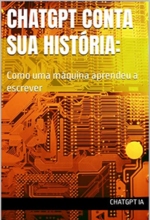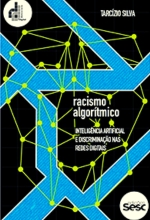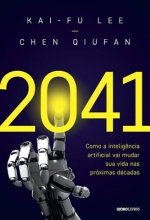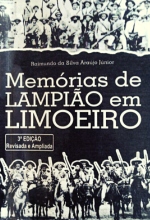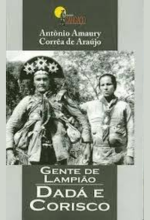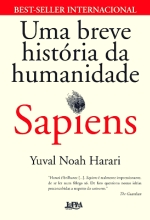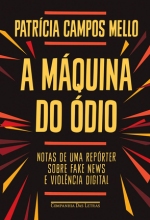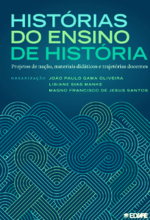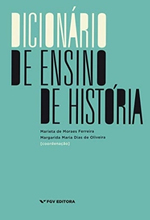Abstract: ChatGPT conta sua história: Como uma máquina aprendeu a escrever, it is an innovative work of 2023, written by AI ChatgPT itself. In 46 pages, it details its evolution and the mechanisms of neural networks, offering a unique perspective on how he learned to write and its challenges in imitation of human language. Keywords: […]
Abstract: Racismo Algorítmico: inteligência artificial e discriminação nas redes sociais, by Tarcizio Silvio addresses structural racism in AI technologies. Silva, master and doctor of humanities, explores the influence of algorithms on the reproduction of racist standards. Although repetitive in some respects, it stands out for not adopting a fatalistic tone and suggesting strategies to combat racial
Abstract: 2041 – Como a Inteligência Artificial vai Mudar sua Vida nas Próximas Décadas, by Kai-Fu Lee and Chen Qiufan, optimically discusses the impact of IAS on society. The work, divided into futuristic tales, explores advances such as deep learning, computational vision and neural networks. Despite promising humanitarian advances, the book does not have clear
Abstract: Memórias de Lampião em Limoeiro, by Raimundo da Silva Araújo Júnior, describes reminiscences about Lampião’s passage through the city of Limoeiro, State of Ceará. The author ambiguously narrates the figure of Lampião, highlighting local characters and the relationship of the city with the cangaço, addressing the complexity of local memory and power. Keywords: Lampião,
Abstract: Memórias de Lampião em Limoeiro, by Raimundo da Silva Araújo Júnior, describes reminiscences about Lampião’s passage through the city of Limoeiro, State of Ceará. The author ambiguously narrates the figure of Lampião, highlighting local characters and the relationship of the city with the cangaço, addressing the complexity of local memory and power. Keywords: Lampião,
Abstract: In Gente de Lampião: Dadá e Corisco, Antônio Amaury Corrêa de Araújo narrates the lives of Dadá and Corisco in the cangaço, exploring their origins and challenges. The work, recognized by experts, combines oral reports with historical analyses. Despite being limited by the emphasis on orality, it represents a valuable contribution to the historiography
Abstract: Dispositivo de racialidade: a construção do outro como não ser como fundamento do ser, Sueli Carneiro, explores racism in Brazil from the Foucaultian perspective. Published in 2023, the book addresses the hegemonic self and the subjugation of the “other”, offering a detailed and critical study of Brazilian racism, but with a complex approach that
Abstract: Dispositivo de racialidade: a construção do outro como não ser como fundamento do ser, Sueli Carneiro, explores racism in Brazil from the Foucaultian perspective. Published in 2023, the book addresses the hegemonic self and the subjugation of the “other”, offering a detailed and critical study of Brazilian racism, but with a complex approach that
Abstract: Sapiens – Uma breve história da humanidade, by Yuval Noah Harari, published in 2020 by Companhia das Letras publisher, explores the cognitive, agricultural and scientific revolutions that shaped humanity. With 471 pages, Harari, an Israeli historian, offers a biological, social and behavioral perspective of the human species. Keywords: History of humanity, revolution, and sapiens. Sapiens — uma
Abstract: Patrícia Campos Mello’s Máquina do ódio discusses the manipulation of information on social networks and their impacts on global elections. The work blends the author’s personal experiences with analyzes of techniques such as Firehoseing and Microtargeting, highlighting the threat to press freedom and democracy. Keywords: Hate, social networks, abd fake news. The book A máquina do
Abstract: João Paulo Gama Oliveira, Lisiane Sias Manke and Magno Francisco de Jesus Santos organized the work Histórias do Ensino de História: projetos de nação, materiais didáticos e trajetórias docentes. This collection brought together works on the history taught in Brazil, in primary, secondary and higher education, in the nineteenth and twentieth centuries. The texts
Abstract: The book “Dicionário de Ensino de História” covers a wide range of topics related to history teaching, including chronological, thematic and local history, as well as teaching and learning methods, curriculum policies and guidelines, heritage education and emerging technologies. Other topics include historical culture, disciplinary codes, stereotypes, sources, and historical narratives. The book also explores topics such as change and permanence, historical awareness, cause and effect, and the progression of historical knowledge. The volume includes contributions from a wide variety of authors as well as coordinators who helped organize the work.
Keywords: History Teaching, Dictionary, History Teacher Training.
Abstract: Currency and Law: A Brazilian monetary history, 1933–2013, is the newest book by Gustavo Franco. It is a writing of the Brazilian economic past after the implementation of fiat currency in the country, which experienced the late genesis of the Central Bank and went through eight financial standards.
Keywords: Economic History, Coin, Brazilian economy, Inflation.
Abstract: Um Feminismo Decolonial by Françoise Vergès presents a critical analysis of traditional and Eurocentric feminism and proposes a decolonial feminism that takes into account the history, culture, and experiences of non-white and colonized women. In addition to presenting Vergès’ vision of radical feminism and the role of women in social transformation, the book addresses the

